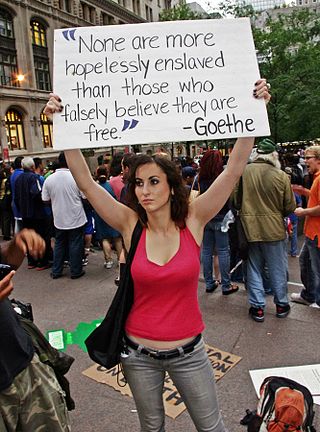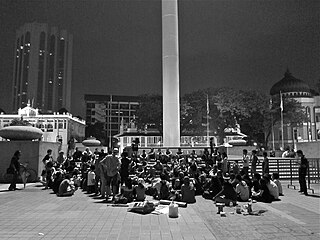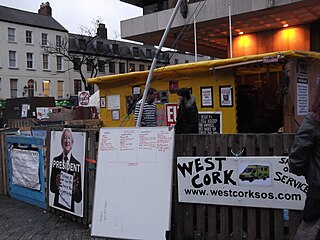
Occupy Wall Street (OWS) was a 59-day left-wing populist movement against economic inequality and the influence of money in politics that had begun in Zuccotti Park, located in New York City's Wall Street financial district, and lasted from September 17 to November 15, 2011. The protests gave rise to the wider Occupy movement in the United States and other Western countries.

The following is a timeline of Occupy Wall Street (OWS), a protest which began on September 17, 2011 on Wall Street, the financial district of New York City and included the occupation of Zuccotti Park, where protesters established a permanent encampment. The Occupy movement splintered after NYC Mayor Bloomberg had police raid the encampment in Zuccotti Park on November 15, 2011. The timeline here is limited to this particular protest during this approximate time-frame.

Occupy San José was a peaceful protest and demonstration in City Hall Plaza in San Jose, California. The demonstration was inspired by Occupy Wall Street and is part of the larger "Occupy" protest movement. The aim of the demonstration was to begin a sustained occupation in downtown San José, the 10th largest city in the United States, to protest perceived corporate greed and social inequality, including opposing corporate influence in U.S. politics, the influence of money and corporations on democracy and a lack of legal and political repercussions for the global financial crisis.

The Occupy movement was an international populist socio-political movement that expressed opposition to social and economic inequality and to the perceived lack of "real democracy" around the world. It aimed primarily to advance social and economic justice and different forms of democracy. The movement has had many different scopes, since local groups often had different focuses, but its prime concerns included how large corporations control the world in a way that disproportionately benefits a minority, undermines democracy and causes instability.

Occupy Chicago was an ongoing collaboration that included peaceful protests and demonstrations against economic inequality, corporate greed and the influence of corporations and lobbyists on government which began in Chicago on September 24, 2011. The protests began in solidarity with the Occupy Wall Street protests in New York.

The 15 October 2011 global protests were part of a series of protests inspired by the Arab Spring, the Icelandic protests, the Portuguese "Geração à Rasca", the Spanish "Indignants", the Greek protests, and the Occupy movement. The protests were launched under the slogan "United for #GlobalChange", to which the slogan "United for Global Democracy" was added by many people's assemblies. The protest was first called for by the Spanish Plataforma ¡Democracia Real YA! in May 2011 and endorsed by people's assemblies across the world. Reasons were varied but mainly targeted growing economic inequality, corporate influence over government and international institutions, and the lack of truly democratic institutions allowing direct public participation at all levels, local to global. Global demonstrations were held on 15 October in more than 950 cities in 82 countries. The date was chosen to coincide with the 5-month anniversary of the first protest in Spain. General assemblies, the social network n-1, mailing lists, Mumble voice chat, open pads such as Pirate Pad and Titan Pad, and Facebook were used to coordinate the events. Some protests were only a few hundred in number, whereas others numbered in the hundreds of thousands, with the largest in Madrid numbering half a million and the second largest city Barcelona with 400,000.

Occupy Dataran was an autonomous grassroots movement based in Kuala Lumpur, that aims to create a platform to experiment participatory democracy based on the popular assembly model. The Malaysian Insider reported that Occupy Dataran was an offshoot of Occupy Wall Street. The online news portal also reported that the Malaysian protesters were expressing solidarity with the New York protest movement as part of the 15 October 2011 global protests. However, it is widely acknowledged that the first Occupy Dataran assembly was held on 30 July 2011, seven weeks before Occupy Wall Street.

Occupy Eugene was a collaboration that occurred in Eugene, Oregon based on the Occupy Wall Street movement which began in New York City on September 17, 2011. Occupy Eugene included peaceful protests and demonstrations. Protesters were concerned about inequities in the distribution of wealth, banking regulation, housing issues and corporate greed. The first protest march was held on October 15, 2011. The march started at the Wayne Morse Free Speech Plaza and continued downtown before marching over Ferry Street Bridge. It was reported that close to 2000 people were in attendance from all over the state of Oregon. Occupy Eugene continued to hold regular protests and actions until it left the encampment in December 2011. Protesters have stated that they do not have a set group of leaders. Occupy Eugene General Assemblies have met from as frequently as twice a day at times during active occupations, and as infrequently as weekly. Many committees have met since at least the third General Assembly, typically weekly. Decisions are made through a process known as consensus. Occupy Eugene's consensus process operates in a similar fashion to how consensus is being handled in New York City by protesters involved in Occupy Wall Street. Although the exact method varies from Occupation to Occupation. As of October 18, 2011, The Eugene police department was allowing protesters to camp in downtown Eugene, although city law prohibits it. Eugene police also stated that downtown camping won't be permanently allowed.
Occupy Las Vegas was an occupation and peaceful protest that began on October 6, 2011. It is affiliated with the Occupy Wall Street movement that began in New York City, and also with the "Occupy" movement in the United States and around the world. A series of meetings that were titled "The General Assembly" or "GA" were held to plan the beginning of the event on October 6, 2011, and were held to create a consensus on policies and planning for the occupation.

Occupy Nashville was a collaboration that began with demonstrations and an occupation located at Legislative Plaza in Nashville, Tennessee. Special legislation attempting to oust the Occupy Nashville demonstration passed the Tennessee House of Representatives and Tennessee Senate in February 2012.

The Occupy movement began in the United States initially with the Occupy Wall Street protests in New York City, but spread to many other cities, both in the United States and worldwide. This list article is an alphabetical, non-chronological summary of Occupy events that have occurred in cities in the United States.
Occupy Texas State is a student activist group formed at Texas State University - San Marcos. It is distinguished from the off-campus but allied Occupy San Marcos.

Occupy Dame Street (ODS) or Occupy Dublin was a peaceful protest and demonstration against economic inequality, social injustice and corporate greed taking place outside the Central Bank of Ireland plaza on Dame Street in Dublin, beside the Temple Bar area of the city. Part of the global Occupy movement, it took its name from the Occupy Wall Street demonstration in New York City's Wall Street financial district. Occupy Dame Street had four requests: the withdrawal of the EU/IMF from Ireland, an end to public ownership of private debt, the return to public ownership of Ireland's privatised oil and gas reserves, and the implementation of what the movement describes as "real participatory democracy". The national police force, Garda Síochána, dismantled their camp during a late-night raid on 8 March 2012. The protesters vowed to fight on. Some were never heard of again, while others found other channels of protest. The most detailed account and analysis of events was written by Helena Sheehan.

Occupy Homes or Occupy Our Homes is part of the Occupy movement which attempts to prevent the foreclosure of people's homes. Protesters delay foreclosures by camping out on the foreclosed property. They also stage protests at the banks responsible for the ongoing foreclosure crisis, sometimes blocking their entrances. It has been compared to the direct action taken by people to prevent home foreclosures during the Great Depression in the United States.

Occupy Redwood City was a collaboration that began with peaceful protests, demonstrations, and general assemblies in front of the historic San Mateo County Courthouse in Redwood City, California. The demonstration was inspired by Occupy Wall Street and is part of the larger "Occupy" protest movement.
The Occupy Wall Street demonstrations garnered reactions of both praise and criticism from organizations and public figures in many parts of the world. Over time, a long list of notable people from a range of backgrounds began and continue to lend their support or make reference to the Occupy movement in general.

Occupy Minneapolis (OccupyMN) is a grassroots collaboration that began in October 2011 with a series of demonstrations in Minneapolis, Minnesota. Protesters have staged numerous occupations, most notably of the Hennepin County Government Center plaza.












